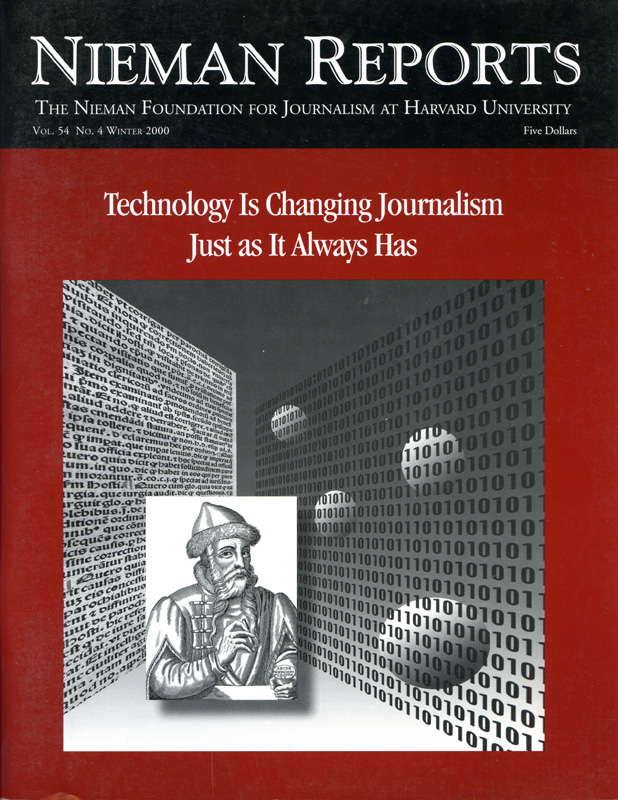
Technology Is Changing Journalism Just as It Always Has
Our journey into the digital future begins with an essay by Tom Regan, associate editor of The Christian Science Monitor’s Web site. His advice: Remember that technology is changing journalism, “as it always has;” wireless is the next publishing realm, and the Web—as a news distribution method—is (almost) already dead.
At 3:20 on a Monday afternoon in August, an e-mail arrived at the NICAR-L [National Institute for Computer-Assisted Reporting listserv], and the subject read “Gun Permit Question—Quick Reply Requested.” James E. Wilkerson, a reporter at The Morning Call in Allentown, Pennsylvania, was looking for online resources to advance a crime story on deadline.
“My boss wants to know if we can get gun permit info in PA for an individual. We know only his name and present address. We want to know whether he had a permit for a gun he is accused of using in a crime,” Wilkerson’s e-mail said. “A State Police officer refused to give us any info, said it wasn’t public record.”
This reporter could have started from scratch. But wading through the legal language of a state’s open-records legislation and assessing the legitimacy of a local official’s interpretation of the law would be time consuming. Offering the question to a group of experienced journalists avoided reinventing the wheel.
Replies from the listserv were quick and concise and helped Wilkerson by stopping him from investing more valuable time into chasing a dead-end lead. Although initial responders suggested potential information sources, within 30 minutes two reporters with Pennsylvania experience confirmed that not only were the gun permit records confidential, state legislators had at one time made it a crime even to request them.
“Thanks for those who responded,” Wilkerson wrote. “You confirmed my vague understanding of the situation.”
Members of IRE-L [Investigative Reporters and Editors listserv] and NICARL have been offering immediate feedback, guidance and resources since IRE launched this service in July 1994. Help comes in a variety of forms, such as phone numbers to contact helpful human sources, directions to information-packed Web sites, and techniques to solve data analysis problems. As a member of these self-moderated listservs, I am able to offer suggestions to reporters based on the resources available at IRE. On various occasions, I’ve referenced morgue stories we have on file or offered tip sheets on this kind of reporting. At times, I’ve suggested books that IRE sells that might be related to the question posed by a journalist. Generally speaking, what I can do to help reporters is most apparent during “big” stories—such as the bombing of the USS Cole—when journalists who might not be knowledgeable about topic-specific issues of a breaking story need resources to cover the news quickly and effectively.
But usually reporters who contact us know their subject matter well. Often it’s a new beat assignment, an unexpected story development or the need to quickly find solutions to technical problems during the computer analysis of data that draw journalists to our site. Jon Leiberman, an investigative reporter at Fox 45 News in Baltimore, wrote to say that he faced data-analysis challenges when working on a computer-assisted story about registered sex offenders living near elementary schools. “I have a database of schools and sex offenders. I’m trying to run a query that matches the sex offenders in each zip code,” said Leiberman in an e-mail that he posted to the NICAR-L listserv at 5:28 p.m. October 10. “For some reason it’s not working. Any ideas?”
By 10 o’clock the next morning, members of the listserv had diagnosed Leiberman’s data problem. He also had received cautionary advice about the possibly poor accuracy of sex offender registration data and the need for more precise mapping information than simply matched zip codes. When he did complete the analysis, Leiberman did a two-part story, one part focusing on the sex offenders’ locations and the other focusing on Maryland’s incomplete and incorrect registration information. Leiberman said advice from the listserv saved him from spending more time digging through software manuals to learn how to solve data problems.
“I came here three and a half months ago. We basically started from the ground up,” Leiberman said. The listserv “was really helpful. I got so much feedback.”
Patricia Coleman is Eugene S. Pulliam Research Director at Investigative Reporters and Editors, Inc.
“My boss wants to know if we can get gun permit info in PA for an individual. We know only his name and present address. We want to know whether he had a permit for a gun he is accused of using in a crime,” Wilkerson’s e-mail said. “A State Police officer refused to give us any info, said it wasn’t public record.”
This reporter could have started from scratch. But wading through the legal language of a state’s open-records legislation and assessing the legitimacy of a local official’s interpretation of the law would be time consuming. Offering the question to a group of experienced journalists avoided reinventing the wheel.
Replies from the listserv were quick and concise and helped Wilkerson by stopping him from investing more valuable time into chasing a dead-end lead. Although initial responders suggested potential information sources, within 30 minutes two reporters with Pennsylvania experience confirmed that not only were the gun permit records confidential, state legislators had at one time made it a crime even to request them.
“Thanks for those who responded,” Wilkerson wrote. “You confirmed my vague understanding of the situation.”
Members of IRE-L [Investigative Reporters and Editors listserv] and NICARL have been offering immediate feedback, guidance and resources since IRE launched this service in July 1994. Help comes in a variety of forms, such as phone numbers to contact helpful human sources, directions to information-packed Web sites, and techniques to solve data analysis problems. As a member of these self-moderated listservs, I am able to offer suggestions to reporters based on the resources available at IRE. On various occasions, I’ve referenced morgue stories we have on file or offered tip sheets on this kind of reporting. At times, I’ve suggested books that IRE sells that might be related to the question posed by a journalist. Generally speaking, what I can do to help reporters is most apparent during “big” stories—such as the bombing of the USS Cole—when journalists who might not be knowledgeable about topic-specific issues of a breaking story need resources to cover the news quickly and effectively.
But usually reporters who contact us know their subject matter well. Often it’s a new beat assignment, an unexpected story development or the need to quickly find solutions to technical problems during the computer analysis of data that draw journalists to our site. Jon Leiberman, an investigative reporter at Fox 45 News in Baltimore, wrote to say that he faced data-analysis challenges when working on a computer-assisted story about registered sex offenders living near elementary schools. “I have a database of schools and sex offenders. I’m trying to run a query that matches the sex offenders in each zip code,” said Leiberman in an e-mail that he posted to the NICAR-L listserv at 5:28 p.m. October 10. “For some reason it’s not working. Any ideas?”
By 10 o’clock the next morning, members of the listserv had diagnosed Leiberman’s data problem. He also had received cautionary advice about the possibly poor accuracy of sex offender registration data and the need for more precise mapping information than simply matched zip codes. When he did complete the analysis, Leiberman did a two-part story, one part focusing on the sex offenders’ locations and the other focusing on Maryland’s incomplete and incorrect registration information. Leiberman said advice from the listserv saved him from spending more time digging through software manuals to learn how to solve data problems.
“I came here three and a half months ago. We basically started from the ground up,” Leiberman said. The listserv “was really helpful. I got so much feedback.”
Patricia Coleman is Eugene S. Pulliam Research Director at Investigative Reporters and Editors, Inc.


